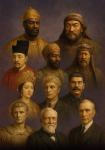The ban on dance bars in Maharashtra came into effect from Sunday with the state government issuing a notification on its implementation.
Governor S M Krishna had on August 9 given his assent to the Mumbai Police (amendment) Bill, 2005, aimed at banning dance bars in the state after it was passed by both the Houses of the state legislature during July's monsoon session.
Replying to a calling attention notice in the assembly during the Budget session of the state Legislature earlier in 2005, Deputy Chief Minister R R Patil had announced that dance bars would be banned.
The state government had sought to effect a ban by promulgating an ordinance, but the governor had returned the same on June 23, saying the government could introduce a bill on the issue in the assembly during its forthcoming session.
Accordingly, the bill was introduced in the House on July 14 during the monsoon session and was passed unanimously by both Houses.
The bill provides for a ban on 'holding of a performance of dance, of any kind, in an eating house, permit room or beer bar'.
According to the bill, "All performance licences, issued under the aforesaid rule by the commissioner of Police or the district magistrate or any other officer, as the case may be, being the licensing authority, to hold a dance performance of any kind or type, in an eating house, permit room or beer bar shall stand cancelled'.
The bill provides for an imprisonment of upto three years and a fine upto Rs 2 lakh for 'any person who holds or causes or permits to hold a dance performance of any kind or type, in an eating house, permit room or beer bar'.
About the objectives and reasons for introducing the bill, Patil, who also holds the Home portfolio, had said, "The eating houses or permit rooms or beer bars to which licenses to hold dance performances have been granted, are permitting performances of dances in an indecent, obscene or vulgar manner."
"It has also been brought to the notice of the government that such performances or dances are giving rise to the exploitation of women," he said.
"The government considers that such performance in an indecent manner is derogatory to the dignity of women and is likely to deprave, corrupt or injure the public morality or morals," he added.
Patil said the attention of the government was drawn to the mushrooming of illegal dance bars and their ill-effects on the society, including ruining of their (dancers') families.
"The members of ruling and opposition benches pointed out that such dance bars are used as meeting points by criminals and pick-up joints for girls indulging in immoral activities and demanded that such dance bars, should therefore be closed down," he said.





